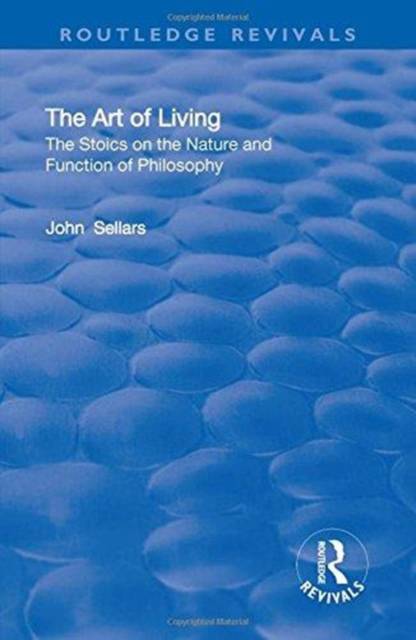
- Afhalen na 1 uur in een winkel met voorraad
- Gratis thuislevering in België vanaf € 30
- Ruim aanbod met 7 miljoen producten
- Afhalen na 1 uur in een winkel met voorraad
- Gratis thuislevering in België vanaf € 30
- Ruim aanbod met 7 miljoen producten
Zoeken
The Art of Living
The Stoics on the Nature and Function of Philosophy
John Sellars
Hardcover | Engels
€ 139,95
+ 279 punten
Uitvoering
Omschrijving
This title was first published in 2003. Presenting philosophy as an art concerned with one's way of life, Sellars draws on Socratic and Stoic philosophical resources and argues for the ancient claim that philosophy is primarily expressed in one's behaviour. The book considers the relationship between philosophy and biography, and the bearing that this relationship has on debates concerning the nature and function of philosophy. Questioning the premise that philosophy can only be conceived as a rational discourse, Sellars presents it instead as an art (techne) that combines both 'logos' (rational discourse) and 'askesis' (training), and suggests that this will make it possible to understand better the relationship between philosophy and biography. The first part of this book outlines the Socratic conception of philosophy as an art and the Stoic development of this idea into an art of living, as well as considering some of the ancient objections to the Stoic conception. Part Two goes on to examine the relationship between philosophical discourse and exercises in Stoic philosophy. Taking the literary form of such exercises as central, the author analyses two texts devoted to philosophical exercises by Epictetus and Marcus Aurelius.
Specificaties
Betrokkenen
- Auteur(s):
- Uitgeverij:
Inhoud
- Aantal bladzijden:
- 238
- Taal:
- Engels
Eigenschappen
- Productcode (EAN):
- 9781138709164
- Verschijningsdatum:
- 30/11/2017
- Uitvoering:
- Hardcover
- Formaat:
- Genaaid
- Gewicht:
- 439 g

Alleen bij Standaard Boekhandel
+ 279 punten op je klantenkaart van Standaard Boekhandel
Beoordelingen
We publiceren alleen reviews die voldoen aan de voorwaarden voor reviews. Bekijk onze voorwaarden voor reviews.











